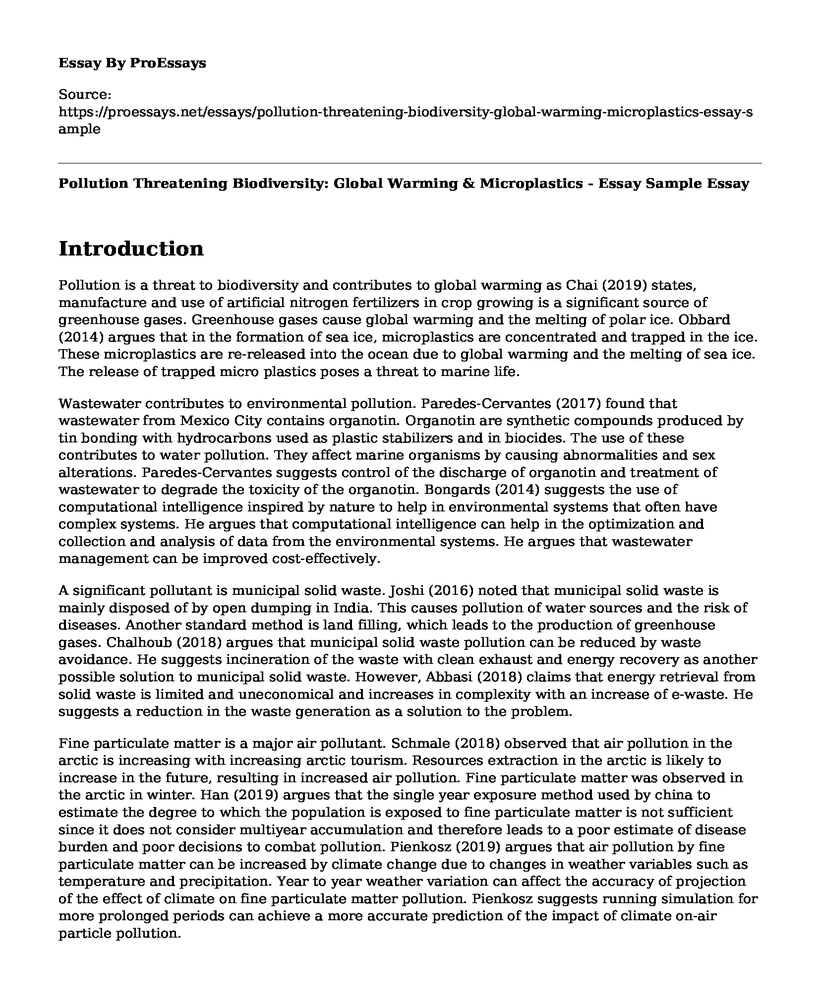Introduction
Pollution is a threat to biodiversity and contributes to global warming as Chai (2019) states, manufacture and use of artificial nitrogen fertilizers in crop growing is a significant source of greenhouse gases. Greenhouse gases cause global warming and the melting of polar ice. Obbard (2014) argues that in the formation of sea ice, microplastics are concentrated and trapped in the ice. These microplastics are re-released into the ocean due to global warming and the melting of sea ice. The release of trapped micro plastics poses a threat to marine life.
Wastewater contributes to environmental pollution. Paredes-Cervantes (2017) found that wastewater from Mexico City contains organotin. Organotin are synthetic compounds produced by tin bonding with hydrocarbons used as plastic stabilizers and in biocides. The use of these contributes to water pollution. They affect marine organisms by causing abnormalities and sex alterations. Paredes-Cervantes suggests control of the discharge of organotin and treatment of wastewater to degrade the toxicity of the organotin. Bongards (2014) suggests the use of computational intelligence inspired by nature to help in environmental systems that often have complex systems. He argues that computational intelligence can help in the optimization and collection and analysis of data from the environmental systems. He argues that wastewater management can be improved cost-effectively.
A significant pollutant is municipal solid waste. Joshi (2016) noted that municipal solid waste is mainly disposed of by open dumping in India. This causes pollution of water sources and the risk of diseases. Another standard method is land filling, which leads to the production of greenhouse gases. Chalhoub (2018) argues that municipal solid waste pollution can be reduced by waste avoidance. He suggests incineration of the waste with clean exhaust and energy recovery as another possible solution to municipal solid waste. However, Abbasi (2018) claims that energy retrieval from solid waste is limited and uneconomical and increases in complexity with an increase of e-waste. He suggests a reduction in the waste generation as a solution to the problem.
Fine particulate matter is a major air pollutant. Schmale (2018) observed that air pollution in the arctic is increasing with increasing arctic tourism. Resources extraction in the arctic is likely to increase in the future, resulting in increased air pollution. Fine particulate matter was observed in the arctic in winter. Han (2019) argues that the single year exposure method used by china to estimate the degree to which the population is exposed to fine particulate matter is not sufficient since it does not consider multiyear accumulation and therefore leads to a poor estimate of disease burden and poor decisions to combat pollution. Pienkosz (2019) argues that air pollution by fine particulate matter can be increased by climate change due to changes in weather variables such as temperature and precipitation. Year to year weather variation can affect the accuracy of projection of the effect of climate on fine particulate matter pollution. Pienkosz suggests running simulation for more prolonged periods can achieve a more accurate prediction of the impact of climate on-air particle pollution.
Conclusion
In conclusion, it is clear that pollution is a threat to human life and biodiversity pollution contributes to climate change and destruction of the environment. The various suggested measures should be taken to limit pollution by plastics and municipal solid wastes to combat climate change and conserve biodiversity.
References
Abbasi, S. A. (2018). The myth and the reality of energy recovery from municipal solid waste. Energy, Sustainability, and Society, 8(1), 36.
Bongards, M., Gaida, D., Trauer, O., & Wolf, C. (2014). Intelligent automation and IT for the optimization of renewable energy and wastewater treatment processes. Energy, Sustainability, and Society, 4(1), 19.
Chai, R., Ye, X., Ma, C., Wang, Q., Tu, R., Zhang, L., &Gao, H. (2019). Greenhouse gas emissions from synthetic nitrogen manufacture and fertilization for main upland crops in China. Carbon Balance and Management, 14(1), 20.
Chalhoub, M. S. (2018). Public policy and technology choices for municipal solid waste management in a recent case in Lebanon. Cogent Environmental Science, 4(1), 1529853.
Han, L., Zhou, W., Pickett, S. T., Li, W., & Qian, Y. (2019). Risks and causes of population exposure to cumulative fine particulate (PM2. 5) pollution in China. Earth's Future, 7(6), 615-622.
Joshi, R., & Ahmed, S. (2016). Status and challenges of municipal solid waste management in India: A review. Cogent Environmental Science, 2(1), 1139434.
Obbard, R. W., Sadri, S., Wong, Y. Q., Khitun, A. A., Baker, I., & Thompson, R. C. (2014). Global warming releases a microplastic legacy frozen in Arctic Sea ice. Earth's Future, 2(6), 315-320.
Paredes-Cervantes, V., Castillo-Vera, J., Gomez-Reynoso, F., Diaz-Cedillo, F., & Aguilar-Santelises, M. (2017). Wastewater from Mexico City contains organotin compounds and organotin-resistant bacteria. Cogent Environmental Science, 3(1), 1347996.
Pienkosz, B. D., Saari, R. K., Monier, E., & GarciaMenendez, F. (2019). Natural variability in projections of climate change impacts on fine particulate matter pollution. Earth's Future, 7(7), 762-770.
Schmale, J., Arnold, S. R., Law, K. S., Thorp, T., Anenberg, S., Simpson, W. R., ...& Pratt, K. A. (2018). Local Arctic air pollution: A neglected but serious problem. Earth's Future, 6(10), 1385-1412.
Cite this page
Pollution Threatening Biodiversity: Global Warming & Microplastics - Essay Sample. (2023, Apr 10). Retrieved from https://proessays.net/essays/pollution-threatening-biodiversity-global-warming-microplastics-essay-sample
If you are the original author of this essay and no longer wish to have it published on the ProEssays website, please click below to request its removal:
- The Global Warming: Easy Ways to Prove
- Conventional Farming Is Better Than Organic Farming: Argumentative Essay
- Relationship Between Environment and Cancers Paper Example
- Essay Sample on Leonardo Dicaprio and Climate Change
- Essay Sample on Climate Change & Extreme Weather: Causes & Effects
- Hurricane Katrina: Learning From a Crisis and Its Political Fallout - Essay Sample
- Essay Example on IPCC Meets in South Korea to Assess Global Warming Impacts







